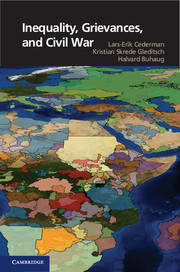Book contents
- Frontmatter
- Contents
- Tables
- Figures
- Preface
- 1 Introduction
- Part I Theories and concepts
- Part II Empirical analysis of civil war onset
- 4 Political Exclusion and Civil War
- 5 Economic Inequality and Civil War
- 6 Transborder Ethnic Kin and Civil War
- 7 Country-Level Inequalities and Civil War
- Part III Beyond civil war onset
- References
- Index
- References
6 - Transborder Ethnic Kin and Civil War
Published online by Cambridge University Press: 05 June 2014
- Frontmatter
- Contents
- Tables
- Figures
- Preface
- 1 Introduction
- Part I Theories and concepts
- Part II Empirical analysis of civil war onset
- 4 Political Exclusion and Civil War
- 5 Economic Inequality and Civil War
- 6 Transborder Ethnic Kin and Civil War
- 7 Country-Level Inequalities and Civil War
- Part III Beyond civil war onset
- References
- Index
- References
Summary
In the previous two chapters, we have explained how the likelihood of civil war outbreak depends on internal conditions within states. In this chapter, we relax this limitation. Indeed, beyond the demonstrated importance of domestic grievances and opportunities, civil wars are often influenced by the wider international environment. A series of recent studies has shown that civil wars can be caused not only by factors inside countries, but also by effects operating across state borders (see, e.g., Salehyan and Gleditsch 2006; Gleditsch 2007). Whereas a first wave of quantitative studies demonstrated that such effects make the “closed-polity” assumption untenable, more recently researchers have made efforts to identify and examine particular causal mechanisms driving conflict, including the role of transborder ethnic kin (TEK) in conflict processes. In contrast to earlier contributions to this literature, which tended to stress identity as the key motivating factor, contemporary scholarship typically highlights how the conjunction of ethnicity and power politics increases the risk of conflict, suggesting that “identity politics is often more about politics than about identity” (King and Melvin 1999/2000, p. 109; see also Mousseau 2001; Thyne 2007; Cederman, Girardin, and Gleditsch 2009). We have emphasized the importance of ethnic exclusion in states, but the political role of ethnicity is of course equally relevant for groups spanning national boundaries.
Despite these recent advances in studying transnational ethnic linkages, a central puzzle remains unresolved, namely how ethnic groups that at least in theory could count on support from large TEK groups often have remained surprisingly peaceful. The most prominent “dog that didn't bark,” or perhaps better “bear that didn't growl,” in this sense are the Russians in the “near abroad.” There was widespread anticipation that the Russian diasporas stranded in former Soviet republics after the collapse of the Soviet Union in the early 1990s would resort to violence, but these communities have remained relatively calm. However, the picture looks entirely different if we consider the Albanians in the former Yugoslavia, or the Armenians in Azerbaijan. These groups have been involved in major fighting with active support from TEK groups. Given a similar pattern of domestic marginalization and cross-border ethnic kin, why then do some groups rebel while others do not?
- Type
- Chapter
- Information
- Inequality, Grievances, and Civil War , pp. 119 - 142Publisher: Cambridge University PressPrint publication year: 2013



